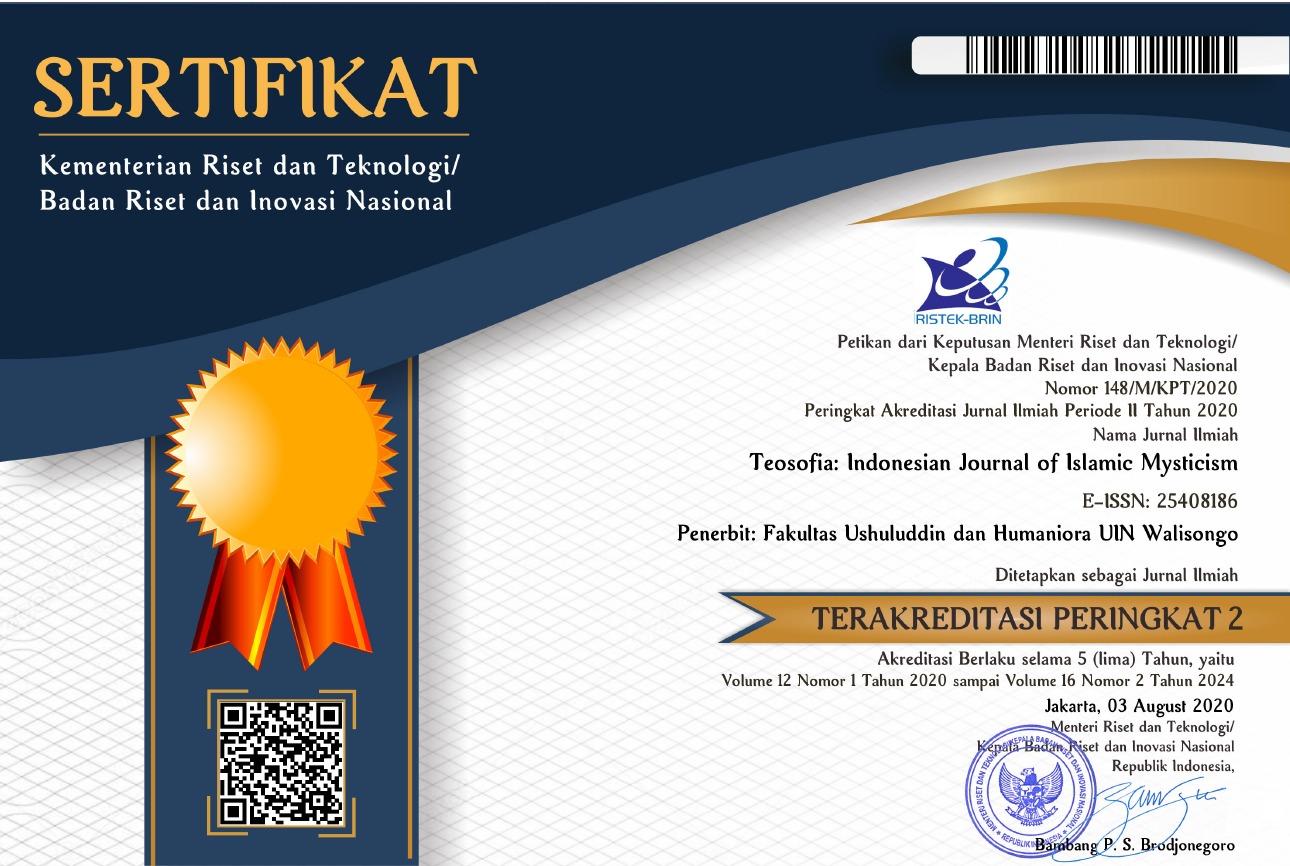Patience in the Perspective of Sufism: Spiritual Strategies for Students to Maintain Mental Health
DOI:
https://doi.org/10.21580/tos.v14i1.27087Keywords:
sufism, patience, spiritual strategies, mental health, Islamic psychotherapyAbstract
The high prevalence of mental health issues among university students highlights the need for a holistic treatment approach that includes not only medical and psychological care but also spiritual support. This study examines the concept of patience in Sufism as a practical spiritual strategy for coping with mental pressure. Using a qualitative phenomenological method, it explores the subjective experiences of eight students through in-depth interviews and focus group discussions. The findings indicate that students who practice patience through Sufi practices achieve enhanced emotional regulation, inner calmness, and spiritual resilience. Rather than mere endurance, patience functions as a spiritual framework that helps students reframe academic stress as divine tests, fostering steadfastness and a deeper sense of purpose.
Contribution: This study contributes to the discourse on Islamic spirituality in psychology, offering an integrative, culturally rooted approach to student mental well-being. It also adds practical insight into applying Sufi teachings in modern contexts.
Downloads
References
(ACHA), American College Health Association. “National College Health Assessment Spring 2023.” American College Health Association, 2023. https://www.acha.org/wp-content/uploads/2024/07/NCHA-III_SPRING_2023_UNDERGRAD_REFERENCE_GROUP_DATA_REPORT.pdf.
Abidin, Zainal, and Akhmad Sirojuddin. “Developing Spiritual Intelligence Through The Internalization of Sufistic Values: Learning From Pesantren Education.” Tafkir: Interdisciplinary Journal of Islamic Education 5, no. 2 (2024): 331–43. https://doi.org/10.31538/tijie.v5i2.783.
Adlina, Atika Ulfia, Zaizul Abd Rahman, Muhammad Sakdullah, Dewi Aisyah, and Ferizka Rizky Al Amin. “Tazkiyat Al-Nafs as Resilience Strategy to Deal with the Post-Pandemic Recession among Micro, Small, and Medium Enterprises (MSMEs) Actors.” Teosofia: Indonesian Journal of Islamic Mysticism 12, no. 1 (2023): 41–60. https://doi.org/10.21580/tos.v12i1.14437.
Afiani, Vivia Zahira, and Muhammad Ruhiyat Haririe. “Sufism and Mental Health: Application of Sufism Principles in Mental Well-Being.” JOUSIP Journal of Sufism and Psychotherapy 4, no. 1 (2024): 103–18. https://doi.org/DOI: https://doi.org/10.28918/jousip.v4i1.8716.
Al-Bukhari, Muhammad bin Ismail. Sahih Bukhari. Juz III. Beirut: Dar Ibnu al-Katsir, 1987.
Al-Ghazali, Abu Hamid. Ihya’’ulum Al-Din: The Revival of the Religious Sciences. Kuala Lumpur: Islamic Book Trust, 2015.
Al-Ghifari, Muhammad Abidzan; “Maqamat and Ahwal (Stations and States in Sufi Spiriuality.” International Journal of Islamic Studies and Social Sciences 3, no. 1 (2025): 37–47. https://jurnal.asrypersadaquality.com/index.php/ijiss/article/view/665.
Aldbyani, Aamer. “Exploring Islamic Mindfulness: Cultural Practices and Their Impact on Public Health Outcomes.” Mindfulness 16 (2025): 695–701. https://doi.org/https://doi.org/10.1007/s12671-024-02485-5.
Alfain, Shinta Nuriya Idatul, Achmad Khudori Soleh, and Muhammad Rafi Yamani. “The Role of Patience in Coping with Mental Problems: A Quranic Perspective.” Tribakti: Jurnal Pemikiran Keislaman 34, no. 2 (2023): 195–212. https://doi.org/10.33367/tribakti.v34i2.3633.
Alhaib, Ekhlas, and Ali Kadhem Alsandi. “The Concept of Morals and Education in Imam Al-Ghazali’s Thought.” Science Frontiers 3, no. 1 (2022): 48–55. https://doi.org/doi: 10.11648/j.sf.20220301.17.
Andrabi, Abroo Aman. Prophet Muhammad: (Peace and Blessings Be upon Him) The Man and The Message. New Delhi: Milli Publications, 2010. https://www.researchgate.net/profile/Dr-Andrabi/publication/354707485_PROPHET_MUHAMMAD_PBUH_THE_MAN_AND_THE_MESSAGE/links/615fd4c90bf51d4817514188/PROPHET-MUHAMMAD-PBUH-THE-MAN-AND-THE-MESSAGE.pdf.
Arifka, Angga, Info Artikel, Artike History, and E-mail Addres. “Mystical Experience in Sufism: The Study of Uniqueness of Sufism in Relation to Mysticism. At-Thullab Jurnal Mahasiswa Studi Islam,” 2025, 52–69.
Bukhari, Syed Faheem Hasan. “Healing the Mind and Soul: An Islamic Approach to Mental Health and Resilience.” Al Khadim Research Journal of Islamic Culture and Civilization VI, no. 1 (2025): 128–33. https://arjicc.com/index.php/arjicc/article/view/393/342.
Cage, Eilidh, Emma Jones, Gemma Ryan, Gareth Hughes, and Leigh Spanner. “Student Mental Health and Transitions into, through and out of University: Student and Staff Perspectives.” Journal of Further and Higher Education 45, no. 8 (2021): 1076–89. https://doi.org/https://doi.org/10.1080/0309877X.2021.1875203.
Casmini, Casmini, Dwiga Aziz Himawan, and Hanis Kusuma Wardhani. “Maqamat Sufistic as a Solution for Coping with Stress.” Enlighten: Jurnal Bimbingan Konseling Islam 3, no. 2 (2020): 60–75. https://doi.org/https://doi.org/10.32505/enlighten.v3i2.1895.
Casmini, Casmini, Faiz Muaddibi, and Firda Amrina Fitri. “Menguatkan Psychologycal Well-Being Konselor Dengan Praktik Perilaku Sufi Amali.” Al-Tazkiah Jurnal Bimbingan Dan Konseling Islam 9, no. 2 (2020): 135–54. https://doi.org/https://doi.org/10.20414/altazkiah.v9i2.2378.
Casmini, Casmini, Musthofa Musthofa, Saptoni Saptoni, Moh Khoerul Anwar, and Laguzo Abubakar. “From Trauma to Growth: A Mixed-Methods Analysis of Psychological Factors in Women’s Experiences of Temporary Marriage.” Psikohumaniora: Jurnal Penelitian Psikologi 9, no. 1 (2024): 59–82. https://doi.org/https://doi.org/10.21580/pjpp.v9i1.20616.
Charles, Nora E, Stephanie J Strong, Lauren C Burns, Margaret R Bullerjahn, and Katherine Serafine. “Increased Mood Disorder Symptoms, Perceived Stress, and Alcohol Use among College Students during the COVID-19 Pandemic.” Psychiatry Research 296 (2021): 113706. https://doi.org/https://doi.org/10.1016/j.psychres.2021.113706.
Duffy, A, C Keown-Stoneman, S Goodday, J Horrocks, M Lowe, N King, W Pickett, et al. “Predictors of Mental Health and Academic Outcomes in First-Year University Students: Identifying Prevention and Early-Intervention Targets.” BJPsych Open 6, no. 3 (2020): e46. https://doi.org/https://doi.org/10.1192/bjo.2020.24.
Egan, Mary, and Jill Swedersky. “Spirituality as Experienced by Occupational Therapists in Practice.” Am J Occup Ther 57, no. 5 (2003): 525–33. https://doi.org/DOI: 10.5014/ajot.57.5.525.
Englander, Magnus, and James Morley. “Phenomenological Psychology and Qualitative Research.” Phenomenology and the Cognitive Sciences 22, no. 1 (2023): 25–53. https://doi.org/10.1007/s11097-021-09781-8.
Fitriyani, Feny Nida, Syamsul Kurniawan, Bayu Suratman, and Egi Tanadi. “Santri 's Spiritual Resilience at Pesantren Mahasiswa of the Institut Daarul Qur'an Jakarta : Capturing Living Sufism amid Modern Society” 13, no. 2 (2024): 213–38. https://doi.org/10.21580/tos.v13i2.23559.
Gürbüz, Sevda Aktulga. “A Key to Excellence: Patience and Patient in the Early Sufis.” Journal for the Education of Gifted Young Scientists 10, no. 1 (2022): 1–10. https://doi.org/Journal for the Education of Gifted Young Scientists.
Han, Jiying, Lei Jin, and Hongbiao Yin. “Supervisors’ Emotion Regulation in Research Supervision: Navigating Dilemmas in an Accountability-Based Context.” Higher Education 89, no. 3 (2025): 671–89. https://doi.org/10.1007/s10734-024-01241-x.
Hidayat, Ahmad, Muhammad Azhar, Halim Purnomo, Sigit Nugroho, Lisfarika Napitupulu, and Indah Yusdanis. “Predictors of Patience in Islamic Psychology: Evidence from Indonesia.” Islamic Guidance and Counseling Journal 7, no. 1 (2024): 1–23. https://doi.org/DOI https://doi.org/10.25217/0020247447400.
Hussain, Shahzad, Ziasma Haneef Khan, Rahila Amin, and Uzma Kanwal. “Spiritual Intelligence, Resilience, and Mental Health: A Comparative Study among University Students with Different Academic Degrees.” Clinical and Counselling Psychology Review 5, no. 1 (2023): 17–34. https://doi.org/10.32350/ccpr.51.02.
Jannah, Saadatul. “Tafsir Tazkiyat Al-Nafs Perspektif Sa’îd H{awwâ Dalam Al-Asâs Fî Tafsîr.” Studia Quranika 7, no. 1 (2022): 57–91. https://doi.org/DOI: http://dx.doi.org/10.21111/studiquran.v7i1.6701.
JIang, Na, Siaw Yan-Li, Kanit Pamanee, and Joko Sriyanto. “Depression, Anxiety, and Stress during the COVID-19 Pandemic: Comparison among Higher Education Students in Four Countries in the Asia-Pacific Region.” Journal of Population and Social Studies 29 (2021): 370–83. https://doi.org/doi.org/10.25133/JPSSv292021.023.
Khalil, Atif. “On Patience (Ṣabr) in Sufi Virtue Ethics.” In Mysticism and Ethics in Islam, 71–78. AUB Press, 2022. https://www.aub.edu.lb/aubpress/PDF Embed Files/Mysticism and Ethics in Islam/08 Atif Khalil.pdf.
Koenig, Harold G. “Religion, Spirituality, and Health: The Research and Clinical Implications.” International Scholarly Research Notices 2012, no. 1 (2012): 278730. https://doi.org/https://doi.org/10.5402/2012/278730.
Kukkonen, T. “Iḥyāʾ ʿUlūm Al-Dīn by Abū Ḥāmid Al-Ghazālī.” In Key Classical Works on Islamic Ethics, 2024.
Langdridge, Darren. “Phenomenology,” 165–83. Palgrave Macmillan/Springer Nature, 2017. https://doi.org/10.1057/978-1-137-51018-1_9.
Li, Fengxiao. “Impact of COVID-19 on the Lives and Mental Health of Children and Adolescents.” Frontiers in Public Health 10 (2022): 925213. https://doi.org/doi: 10.3389/fpubh.2022.925213.
Li, Wenzhen, Zhiya Zhao, Dajie Chen, Ying Peng, and Zuxun Lu. “Prevalence and Associated Factors of Depression and Anxiety Symptoms among College Students: A Systematic Review and Meta‐analysis.” Journal of Child Psychology and Psychiatry 63, no. 11 (2022): 1222–30. https://doi.org/https://doi.org/10.1111/jcpp.13606.
Liu, Xiangliang. “Effect of Teacher–Student Relationship on Academic Engagement: The Mediating Roles of Perceived Social Support and Academic Pressure.” Frontiers in Psychology 15 (2024): 1331667. https://doi.org/https://doi.org/10.3389/fpsyg.2024.1331667.
Lone, Niyaz Ahmad. “The Role and Significance of Taṣawwuf in Modern-Day Crisis.” Teosofia: Indonesian Journal of Islamic Mysticism 11, no. 1 (2022): 83–102. https://doi.org/10.21580/tos.v11i1.12030.
Lubis, Zuraidah, Muhammad Bukhori Dalimunthe, Wildansyah Lubis, Reza Aditia, and Raudah Zaimah Dalimunthe. “Examining Coping Strategies and Academic Resilience among Indonesian Students: The Role of Gender and Domicile.” Pegem Journal of Education and Instruction 14, no. 3 (2024): 183–91. https://doi.org/https://doi.org/10.47750/pegegog.14.03.17.
Majid, M. Kharis, Winda Roini, Azmi Putri Ayu Wardani, and Maulida Hasyyah Sabrina. “The Urgency of Spiritual Healing during the Coronavirus Outbreak.” Teosofia: Indonesian Journal of Islamic Mysticism 11, no. 1 (2022): 23–42. https://doi.org/10.21580/tos.v11i1.9569.
Makmudi, Makmudi. “Concept of Mental Education: A Perspective of Ibn Qayyim Al-Jawziyyah.” Jurnal Dirosah Islamiyah 3, no. 3 (2021): 407–19. https://doi.org/DOI https://doi.org/10.47467/jdi.v3i3.533.
Martinez, Diana. “Patience, Its Role in Our Life – A Definition Academic Article.” Asia Pacific Journal of Religions and Cultures 6, no. 1 (2022): 17–35. https://so06.tci-thaijo.org/index.php/ajrc/article/view/256230.
McLafferty, Margaret, Natasha Brown, Rachel McHugh, Caoimhe Ward, Ailis Stevenson, Louise McBride, John Brady, et al. “Depression, Anxiety and Suicidal Behaviour among College Students: Comparisons Pre-COVID-19 and during the Pandemic.” Psychiatry Research Communications 1, no. 2 (2021): 100012. https://doi.org/https://doi.org/10.1016/j.psycom.2021.100012.
Muhammadu Ibrahim Nasrin. “The Influence of Islamic Spiritual Values on Students’ Mental Health: A Special Focus on Tawakkul (توكُّل), Sabr (صبر) and Shukr(شكر).” LECTURES: Journal of Islamic and Education Studies 4, no. 2 (2025): 260–72. https://doi.org/10.58355/lectures.v4i2.150.
Nufus, Dewi Hayati, Sururin Sururin, and Akhmad Sodiq. “Tafakkur: A Contemplation of Students’ Spiritual and Emotional Intelligence (in The Perspective of Sufism & Transpersonal Psychology).” DAYAH: Journal of Islamic Education 6, no. 2 (2023): 264. https://doi.org/10.22373/jie.v6i2.18957.
Pargament, Kenneth I; Exline, Julie J. “Religious and Spiritual Struggles and Mental Health: Implications for Clinical Practice.” In Spirituality and Mental Health across Cultures, 395–412, 2021. https://books.google.co.id/books?hl=id&lr=&id=Dhk5EAAAQBAJ&oi=fnd&pg=PT381&dq=Pargament,+K.+I.,+%26+Exline,+J.+J.+(2021).+Religious+and+spiritual+struggles+and+mental+health:+Implications+for+clinical+practice.+Spirituality+and+mental+health+across+cultur.
Percy, William H, Kim Kostere, and Sandra Kostere. “Generic Qualitative Research in Psychology.” The Qualitative Report 20, no. 2 (2015): 76–85. https://doi.org/https://doi.org/10.46743/2160-3715/2015.2097.
Pihasniwati, Pihasniwati, Subandi Subandi, Abdul Mujib, Rofidah Qonitah Taqiyyah, Wiwi Siti Sajaroh, and Dewi Aprillia Ningrum. “A Scoping Review: Religiosity/Religious Coping as An Approach for Non-Suicidal Self-Injury (NSSI).” In Proceedings of the 5th International Graduate Conference in Islam and Interdisciplinary Studies, IGCIIS 2022, 19-20 October 2022, Mataram, Lombok, Indonesia. EAI, 2023. https://doi.org/http://dx.doi.org/10.4108/eai.19-10-2022.2332312.
Pihasniwati, Pihasniwati, Ratna Yunita Setiyani Subardjo, Rika Apriliyani, and Elisa Kurniadewi. “Dzikr Relaxation to Decrease College Student’s Anxiety and Increase Happiness.” PSIKIS-Jurnal Psikologi Islami 10, no. 1 (2024): 156–66. https://doi.org/https://doi.org/10.19109/psikis.v10i1.22135.
Pradityas, Yoana Bela, Imam Hanafi, and Esti Zaduqisti. “Maqamat Tasawuf Dan Terapi Kesehatan Mental (Studi Pemikiran Amin Syukur).” Religia Jurnal Ilmu-Ilmu Keislaman 18, no. 2 (2015): 187–206. https://doi.org/DOI: https://doi.org/10.28918/religia.v18i2.627.
Prokopowicz, Anna, Bartłomiej Stańczykiewicz, and Izabella Uchmanowicz. “Health in the Context of Psychological Flexibility and Acceptance and Commitment Therapy.” Medical Research Journal 6, no. 3 (2021): 249–53. https://doi.org/10.5603/mrj.a2021.0032.
Rusdi, Ahmad. “Patience in Islamic Psychology and Its Measurement.” Paper submission for The 3rd Inter-Islamic University Conference on Psychology, 2016.
Setiawan, Mohamad Nur Kholis. “Sufism and Pandemic: Lessons Learned from Sufi Teachings and Its Prominent Figures.” Teosofia: Indonesian Journal of Islamic Mysticism 10, no. 2 (2021): 161–76. https://doi.org/10.21580/tos.v10i2.10054.
Slimmen, Sybren, Olaf Timmermans, Kalina Mikolajczak-Degrauwe, and Anke Oenema. “How Stress-Related Factors Affect Mental Wellbeing of University Students: A Cross-Sectional Study to Explore the Associations between Stressors, Perceived Stress, and Mental Wellbeing.” PLoS One, 2022, 17, no. 11 (n.d.): e0275925. https://doi.org/doi: 10.1371/journal.pone.0275925.
Suwito, Suwito, Ischak Suryo Nugroho, Maulana Mualim, and Eka Septiani Sarastuti. “Sufism-Based Management for Improving Working Performance in the 4.0 Industrial Era: A Phenomenological Perspective.” Teosofia: Indonesian Journal of Islamic Mysticism 12, no. 1 (2023): 1–20. https://doi.org/10.21580/tos.v12i1.14323.
Syafii, Muhammad Hisyam, and Husain Azhari. “Manifestation of Patience as a Coping Mechanism in Islamic Psychology: A Comparative Analysis of Sociocultural Contexts of Indonesian and Egyptian Students.” Psikoislamika : Jurnal Psikologi Dan Psikologi Islam 21, no. 2 (2024): 252–90. https://doi.org/10.18860/psikoislamika.v21i2.29006.
WHO, World Health Organization. “Mental Health.” World Health Organization, 2022. https://www.who.int/news-room/fact-sheets/detail/mental-health-strengthening-our-response.
Yucel, S. “Healing the Soul: An Islamic Approach to Psychology and Mental Health.” International Journal of Islamic Thought 11, no. 1 (2017): 18–29. https://doi.org/10.24035/ijit.11.2017.003.
Yusuf, Hamza. Signs, Symptoms, and Cures of the Spiritual Diseases of the Heart. 2022, 2025. https://sufi.co.za/wp-content/uploads/2021/06/purification-of-the-heart-.pdf.
Downloads
Published
How to Cite
Issue
Section
License

This work is licensed under a Creative Commons Attribution-ShareAlike 4.0 International License.
Copyright
The copyright of the received article shall be assigned to the journal as the publisher of the journal. The intended copyright includes the right to publish the article in various forms (including reprints). The journal maintains the publishing rights to the published articles. Therefore, the author must submit a statement of the Copyright Transfer Agreement.*)
Licensing

This work is licensed under a Creative Commons Attribution-ShareAlike 4.0 International License.
In line with the license, authors are allowed to share and adapt the material. In addition, the material must be given appropriate credit, provided with a link to the license, and indicated if changes were made. If authors remix, transform or build upon the material, authors must distribute their contributions under the same license as the original.
_______
*) Authors whose articles are accepted for publication will receive confirmation via email and send a Copyright Transfer Agreement.








